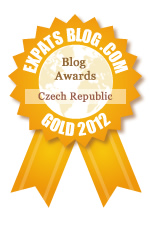 Tonight I'm off to another going away party but this time it is in Bratislava. Eiko is moving to Stockholm and it's a little sad because she is the last of my "Bratsville" crew. Since I'm off tonight I might as well give a little background on Slovakia; not Slovenia.
Tonight I'm off to another going away party but this time it is in Bratislava. Eiko is moving to Stockholm and it's a little sad because she is the last of my "Bratsville" crew. Since I'm off tonight I might as well give a little background on Slovakia; not Slovenia.Officially it is the Slovak Republic, but everyone simply calls the country Slovakia. Unlike with the ČR, where everyone calls it the Czech Republic and never simply "Czechia".
 While Slovaks have been around for ~1,500 years, they've never really had a country. Slovaks were part of the Kingdom of Hungary for over 1,000 years and then a part of the Austro-Hungarian Empire until the end of WWI. In 1918, Slovakia joined with Bohemia, Moravia and Silesia and formed Czechoslovakia.
While Slovaks have been around for ~1,500 years, they've never really had a country. Slovaks were part of the Kingdom of Hungary for over 1,000 years and then a part of the Austro-Hungarian Empire until the end of WWI. In 1918, Slovakia joined with Bohemia, Moravia and Silesia and formed Czechoslovakia. After the Nazis annexed the Sudetenland from Czechoslovakia, Germany threatened to annex Slovakia unless it declared its independence. This was the first time that there had ever been an independent Slovakia; although it was just a Nazi puppet state. Slovakia was finally liberated by Soviet and Romanian forces in April 1945. After the war it rejoined Czechoslovakia.
 The Velvet Revolution in 1989 allowed Czechoslovakia to overthrow its communist government. On 1 January 1993, the Velvet Divorce split the country in to the independent Czech and Slovak Republics. Today, Slovakia is a parliamentary democracy with a multiparty system. Bratislava is the country's capital. It is also the largest city; about the same size as Brno.
The Velvet Revolution in 1989 allowed Czechoslovakia to overthrow its communist government. On 1 January 1993, the Velvet Divorce split the country in to the independent Czech and Slovak Republics. Today, Slovakia is a parliamentary democracy with a multiparty system. Bratislava is the country's capital. It is also the largest city; about the same size as Brno. Slovakia is about twice the size of New Hampshire and has a population of 5.2 million. My hometown of Atlanta has the same population as the whole country of Slovakia. Slovaks make up about 85% of the population with Hungarians at ~11%, Roma (Gypsies) at ~2% and Czechs at just over 1%. The country borders Austria, Czech Republic, Hungary, Poland and Ukraine.
Slovakia is about twice the size of New Hampshire and has a population of 5.2 million. My hometown of Atlanta has the same population as the whole country of Slovakia. Slovaks make up about 85% of the population with Hungarians at ~11%, Roma (Gypsies) at ~2% and Czechs at just over 1%. The country borders Austria, Czech Republic, Hungary, Poland and Ukraine.While the ČR is one of the most atheist countries in the world, Slovaks are much more religious. About 60% of the country is Roman-Catholic.
 |
| €1 coin |
In 2004, Slovakia joined the EU. It is also a member of the UN, NATO and Schengen Area. In 2009, it joined the Eurozone. All of the international cooperation is a good thing but Slovakia still has a few things to sort out with Hungary. The whole ethnicity vs. citizenship thing is different from what I'm used to. In 2009, the Slovak parliament passed a language law that targets the large Hungarian minority which forbids the use of anything other than Slovak in state institutions. In the ČR, people can use Czech or Slovak when dealing with government agencies. Hungary hasn't helped by offering Hungarian passports to ethnic Hungarians in Slovakia. Here's a video from 2010 that I found out on YouTube which talks about the Hungarian minority in Slovakia.
©Euro News


























No comments:
Post a Comment